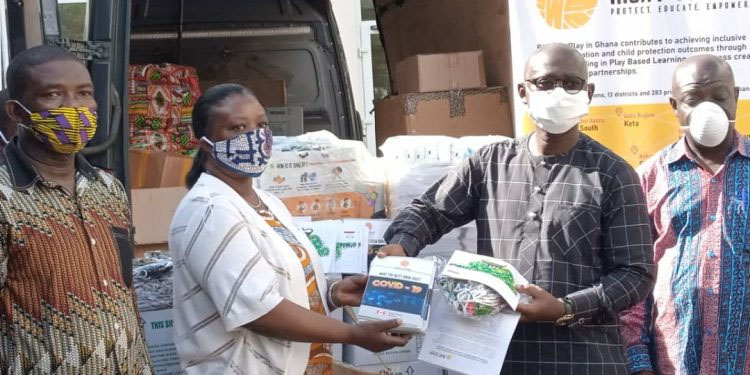Josephine Mukakalisa handing over the donation to Professor Kwasi Opoku-Amankwa
The Ghana Education Service (GES) has praised Right To Play Ghana for its decision to extend psychosocial support to children, especially those in rural communities as schools remain closed indefinitely.
President Akufo-Addo in March announced the indefinite suspension of school activities as part of measures to prevent the spread of Coronavirus (Covid-19).
Thus, to keep children on the learning track, Right to Play Ghana is begining an initiative where teachers will give learning opportunities to children in communities where they may not have access to radio and the internet.
The psychosocial support project would be carried out in six districts across the country, starting May.
Over 100 volunteered teachers in Ga South, Keta, Kumbungu, Tolon and Savelugu will be participating in the project by visiting homes to take children through various lessons and games designed to build during this period of the pandemic.
GES Director-General, Professor Kwasi Opoku-Amankwa, described the initiative by Right To Play as a “special one” which will help children and their parents in rural Ghana.
He gave the commendation when Right To Play made a donation of Personal Protective Equipment (PPEs) and education materials worth GH¢532, 000 to the Service.
The donation included 1,200 pieces of locally manufactured nose masks, 50 boxes of handwashing soap, 250 boxes of hand gloves, 7,000 pieces of hand sanitizer, 2000 pieces pens and 2000 pieces of pencils.
Also, 4,000 copies of exercise books, and 4,000 copies of level-appropriate storybooks, as well as 3000 copies of specially designed communication material on Covid-19, were presented to the GES.
The Country Director of Right To Play Ghana, Josephine Mukakalisa said the decision to undertake the project was driven by “our vision to help children overcome adversities.”
She stated that Right To Play will be supporting the various education directorates in the six districts to “provide supplemental learning, health and psychosocial support to the children and their families in the midst of the Covid-19 pandemic.”
By Jamila Akweley Okertchiri


